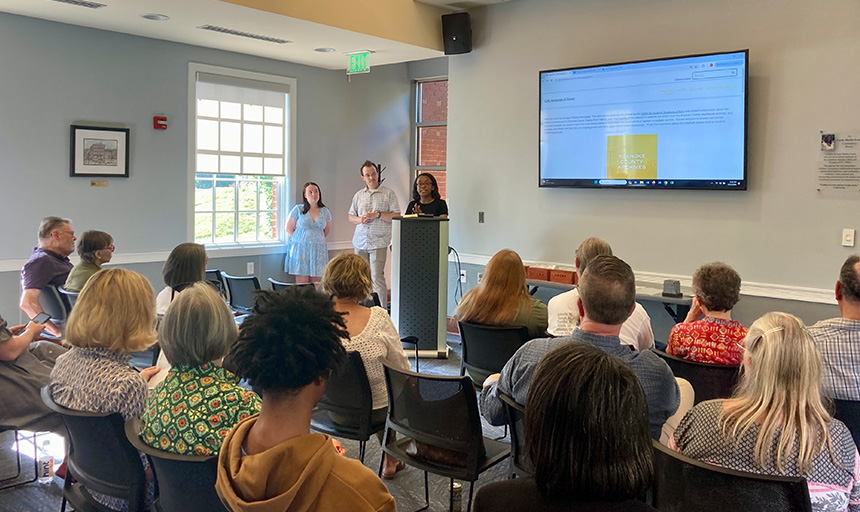Center for Studying Structures of Race receives grant for student research programs
June 24, 2024
Category: Center for Studying Structures of Race

The Center for Studying Structures of Race has been awarded a $100,000 grant from the Gerard B. Lambert Foundation to support the center’s in-depth student research work and education initiatives.
The funding, in part, will make it possible for five student researchers to work with CSSR Director Jesse Bucher this summer to document the previously untold personal histories of enslaved people within the Roanoke Valley.
The full-time, summer research posts allow students to continue work on CSSR’s Genealogy of Slavery research project that first began in 2019. The initiative also furthers Roanoke College’s commitment to better understanding the complex legacies of slavery.
RELATED: Roanoke College creates center to study issues of race
“We are deeply honored to be recognized and supported by the Gerard B. Lambert Foundation," said Bucher, who's led CSSR since its founding. "The grant funds will both sustain and enhance our student-centered research endeavors and will further contribute to a broader understanding of Virginia’s history.”
The grant will be used across multiple years to support the center’s growing portfolio of student research and education projects. The Gerard B. Lambert Foundation was created to carry on the legacy of philanthropist Gerard B. Lambert and his passion for contributing to the betterment of society. The CSSR grant was bestowed in honor of well-known attorney and equal justice advocate Alexander D. Forger.
The funding comes amid a major milestone for CSSR’s student research work. The team is preparing to launch a new public database sharing the names and genealogy of over 2,800 enslaved people who lived in what is now Roanoke County, Roanoke City and Salem.
The information was painstakingly culled from handwritten historical records archived with the Roanoke County Circuit Court. Students spent three years poring over books of wills, birth/death registers and estate records. The information had to be hand transcribed and catalogued before being converted into the new searchable database.
The database tool, which is viewable online now, is about 75-80% complete, Bucher said. New entries are being added constantly. Compiling a single entry can take hours as students triangulate information from the many sources in their research to provide the fullest picture possible of a person’s life.
RELATED: CSSR Genealogy of Slavery Database
Frustrations and sobering realities come along with the work. Historical records of enslaved people are often spartan and treat them not as human beings but as property to be accounted for.
But through their efforts, CSSR’s student team is making it possible to start piecing together people’s names, family ties and histories — restoring a measure of respect and care to a community that was hidden from view for too long.
“The records are really difficult to sit down and read,” said Sydney Pennix ’25, who’s been a student researcher with the project since 2022. “But when you get to tell people about what you’ve found and show them a more well-rounded account of our community’s history, it’s so rewarding.”
“To be able to start showing people the database — something tangible that they can click through and maybe find something that resonates with them — is really incredible,” she added.
On June 11, the research team gave one of its first public demonstrations of the database at a gathering of the Roanoke Valley Preservation Foundation. Step by step, students explained the years of work that went into making the resource possible.
Photo: CSSR Director Jesse Bucher and student researchers Sydney Pennix ’25 (center) and Jayde Mooney ’25 answer questions after a June 11 event held at the Gainsboro Branch Library in Roanoke.

“It’s mind-blowing how dedicated they’ve been in pulling all of this together,” said Roanoke Valley Preservation Foundation President Whitney Leeson, who’s also a professor of history at Roanoke College. “I think this is an incredibly significant resource for Roanoke and beyond.”
The database is available for public use at no charge. Historians hope it will not only shed light on an important part of our region’s past but also help family genealogists who can struggle to trace their ancestors back through this era.
“I think it could help empower local people who’ve never been able to know their family history this far back,” said Wendy Warren, regent of the Colonel William Preston DAR Chapter, which recently offered a workshop series designed for Black Virginians learning to navigate the challenging but rewarding work of genealogy.
“It’s interesting how complex it can become,” added Warren, who was among about two dozen preservation foundation members on hand for the database demonstration.
The database is on track to be uploaded with all current research by the end of this summer. More information will be added as future research yields new findings
This is one of many projects that CSSR is leading. In another major initiative, the center is working to create a memorial to enslaved laborers on Roanoke College’s campus.
Design work on that installation is underway now. Artist and educator Sandy Williams IV, a powerful voice in the intersection of art and historical memory, has been selected as the memorial’s designer.
More announcements about that project are expected this year.
Learn More
-
CSSR was established by Roanoke College in 2020 as a hub for teaching, research and public engagement on issues of race. In addition to shedding light on a vital part of our region’s past, it has offered students unique opportunities for firsthand learning that sharpen their skillset and expand their understanding of the world. More information is available at roanoke.edu/CSSR.